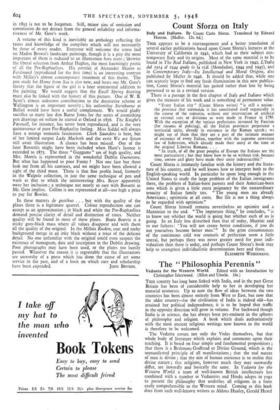Count Sforza on Italy
Italy and Italians. By Count Carlo Sforza. Translated by Edward Hutton. (Muller. 12s. 6d.)
nits appears to be a rearrangement and a better translation of several earlier publications based upon Count Sforza's lectures at the University of California in 1942, which had as their subject con- temporary Italy and its origins. Most of the same material is to be found in The Real Italians, published in New York in 1942, L'Italia dal 1914 al 1944 quale io la vidi (Mondadori, 1944 and 1945), and in Contemporary Italy—Its Intellectual and Moral Origins, also published by Muller in 1946. It should be added that, while one can scarcely hope to find any fresh illumination in this new publica- tion, Count Sforza's material has gained rather than lost by being presented to us in a revised version.
There is a passage in the first chapter of Italy and Italians which gives the measure of his work and is something of permanent value. " Every Italian city " (Count Sforza writes) " is still a nation :
the province that surrounds it has constituted itself organically in the course of the centuries without any intervention of artificial or rational cuts or divisions as were made in France in 1790. With the exception of the various prefectures invented by Fascism (for reasons of policing), all the Italian provinces perpetuate a territorial. unity, already in existence in the Roman epoch ; we might say of them that they are a part of the intimate manner of existence of every Italian, together with the supreme unwritten law of federation, which already made their unity at the time of the original Libertas Romana. . .
" In truth, of all the great peoples of Europe the Italians are the most particularist ; but they know how to be so without risk, because time, sorrow and glory have made their unity indestructible." Count Sforza is intimately familiar with the history and the litera- ture of his country, and he well knows how to interpret both to the English-speaking world. In particular he spent long enough in the United States to study the large problem of the Italian immigrants there, the problem of Italian-born parents and their American-born sons which is given a little extra poignancy by the extraordinary tenacity of Italian family ties. " The young men are already
Americans; at all costs. But life is not a thing always to be regared with optimism."
Count Sforza himself remains nevertheless an optimist and a Mazzinian to the end. " The important thing," he concludes, "is to know not whither the world is going but whither each of us is going. In an Italy less disturbed than that of today, Mazzini said to our fathers : ' You will not create better conditions, if you do not yourselves become better men.' " In the grim circumstances of the continuous cold war counsels of perfection seem a little unreal, but perhaps there was never greater need for pure indi- vidualism than there is today, and perhaps Count Sforza's book may help to strengthen individualistic determination here and there.
ELIZABETH WISKEMANN.










































 Previous page
Previous page